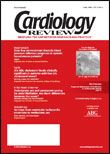Heart failure and diabetes in an elderly woman: Some unanswered questions
A 75-year-old woman with a history of hypertension, coronary artery disease, and diabetes had gradually worsening shortness of breath.
A 75-year-old woman with a history of hypertension, coronary artery disease, and diabetes had gradually worsening shortness of breath. She had been hospitalized several times over the previous 6 months because of worsening heart failure. The patient experienced dyspnea on minimal exertion, but did not have it at rest. She also reported orthopnea and 1 episode of paroxysmal nocturnal dyspnea. She had developed progressive ankle and lower leg edema during this period. She did not have chest pain, and her vital signs were normal.
Physical examination confirmed the leg edema, and the patient had a jugular venous pressure of 8 cm H2O. An electrocardiogram showed normal sinus rhythm, and a chest radiograph showed cardiomegaly but no pulmonary congestion. She had a left ventricular ejection fraction of 0.55 based on a recent echocardiogram. A recent coronary angiogram showed no flow-limiting stenoses of any major coronary arteries. In addition to taking insulin for her diabetes, the patient was also taking 10 mg/day of lisinopril (Prinivil, Zestril), 50 mg of metoprolol (Lopressor, Toprol) twice daily, and 20 mg/day of torsemide (Demadex).
What is the effect of diabetes on the patient's morbidity and hospitalization? Is the effect of diabetes on her heart failure worse because of her sex? Is the effect of diabetes the same for younger and older women with heart failure? More studies are needed to shed light on these questions.
